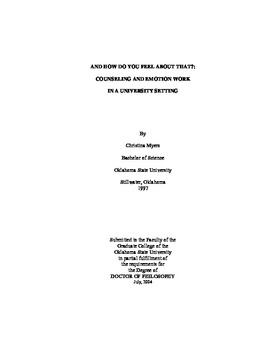| dc.contributor.advisor | Van Delinder, Jean | |
| dc.contributor.author | Myers, Christina | |
| dc.date.accessioned | 2013-11-26T08:28:02Z | |
| dc.date.available | 2013-11-26T08:28:02Z | |
| dc.date.issued | 2004-07 | |
| dc.identifier.uri | https://hdl.handle.net/11244/7008 | |
| dc.description.abstract | Scope and method of study: this study examines the emotion work of university counselors within the context of everyday counseling situations. Fourteen interviews served as the primary data to (1) determine how counseling staff maneuver everyday counseling encounters (2) explore the counseling process in terms of emotion work and emotional/emotive dissonance, and; (3) illustrate the impact of organizational and professional phenomena on counseling processes in a post-secondary setting. This is exploratory and qualitative and involved the use of a triangulation strategy. Online, telephone, and face-to-face-interviews, and the analyses of professional documents and counseling center mission statements were employed to conduct this study. Further, the concepts of Goffman's impression management, and Hochschild's emotion management were used as sensitizing concepts to guide the research. Counselors share their stories of "doing" emotion and emotion work, discuss techniques of self, other, joint, and reciprocal emotion work, and relate both the challenges and rewards of practicing in a post-secondary setting. | |
| dc.description.abstract | Findings and conclusions: The findings suggest that counseling work is essentially emotion work that is impacted by organizational display rules and professional feeling norms, and both impacts and is impacted by personal feelings. There is evidence that the changing organizational structure of higher education (from a collegial model to a more hierarchical and bureaucratic model) is a substantial factor in identity disruption among counselors and therefore plays a significant part in counselor stress and accompanying "compassion fatigue" or "burnout."� | |
| dc.description.abstract | Counselors use self-, other-, and joint-emotion work when interacting with clients and illustrate how each of these is undertaken to the therapeutic benefit of the client. Counselors were also forthcoming about the rewards of their work, as well as the challenges. | |
| dc.description.abstract | Further research is indicated on counseling emotion work using face-to-face interviewing to supplement computer mediated interviewing, emotion work during critical incidents, and the ideology and values inherent in counseling work metaphors. | |
| dc.format | application/pdf | |
| dc.language | en_US | |
| dc.rights | Copyright is held by the author who has granted the Oklahoma State University Library the non-exclusive right to share this material in its institutional repository. Contact Digital Library Services at lib-dls@okstate.edu or 405-744-9161 for the permission policy on the use, reproduction or distribution of this material. | |
| dc.title | And how do you feel about that?: Counseling and emotion work in a university setting | |
| dc.contributor.committeeMember | Webb, Gary | |
| dc.contributor.committeeMember | Knottnerus, J. David | |
| dc.contributor.committeeMember | Van de Poel Knottnerus, Frederique | |
| osu.filename | Myers_okstate_0664D_1057.pdf | |
| osu.accesstype | Open Access | |
| dc.type.genre | Dissertation | |
| dc.type.material | Text | |
| thesis.degree.discipline | Sociology | |
| thesis.degree.grantor | Oklahoma State University | |
